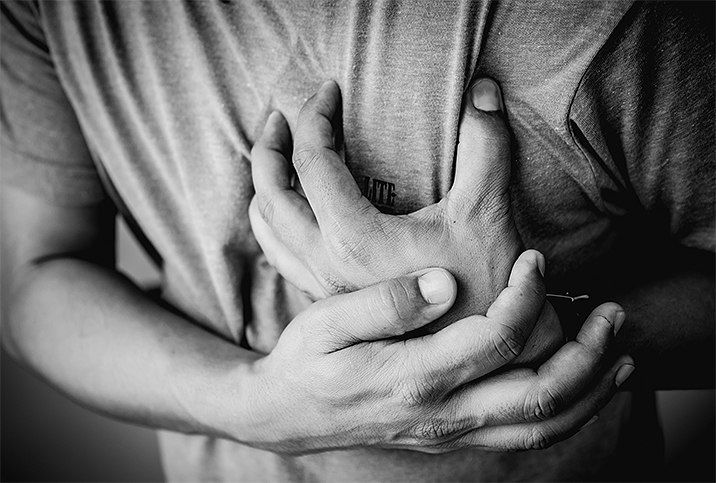5 Resolutions for a Healthier Heart—and Penis—in the New Year

The healthier your heart, the healthier your penis. That's right, the most important organ and possibly the most treasured organ are inextricably tied together. In fact, there's a direct link between erectile dysfunction (ED) and heart health, so if you want a healthier penis in this year, start with your heart.
Of course, you likely know that eating low-calorie foods and exercising are vital to good heart health, and breaking these actions down into simple, specific steps can help you start attaining your goals right away.
The short version of how heart health and penis health are connected is simple, said Petar Bajic, M.D., a member of the American Urological Association and a urologist at the Cleveland Clinic. The penis relies on two arteries, each less than 1 to 2 millimeters in diameter, for erectile function. Erectile dysfunction can occur when the lining of these arteries hardens or narrows, which is an indicator of heart disease.
In fact, ED can be an early warning sign of heart disease, said Mohit Khera, M.D., the president-elect of the Sexual Medicine Society of North America and a professor of urology at Baylor College of Medicine in Houston.
The four pillars of good heart health are diet, exercise, sleep and stress reduction, Khera said. You'll see these themes reflected in the tips for a better year.
1. Make 'me time'
Reducing stress is a well-known way to improve heart health, because chronic high stress can increase the risk for heart disease or stroke. Of course, you can't eliminate or necessarily even control the stresses of work and family life, but what you can do, according to Khera, is carve out time for yourself to do activities that bring you joy and relaxation.
"I tell patients also to do things you love," Khera said. "That can be as active or inactive as you like, whether it's reading, hiking or even catching up on sleep. Your 'me time' can be just taking a nap, if you want to take a nap."
Put time on your calendar or agree with your partner or do whatever you need to do to formally set aside time to do something that is just for you—something that relaxes you and makes you happy.
2. Get physical
Ride a bike. Swim. Do water aerobics. Simply walk. Or find another way to get a cardiovascular workout that meets the American Heart Association's recommendation of 150 minutes of moderate-intensity aerobic activity a week. The AHA also recommends muscle-strengthening activity two days a week, but a meandering 90-minute weightlifting session at the gym where you barely break a sweat may not cut it. Bajic said it's essential to get your heart rate up for a sustained period of time on a regular basis.
Running would seem like an obvious recommendation, but the jarring physical impact of running isn't great for aging joints. Low-impact exercises, such as swimming or biking, can be beneficial. Naturally, any exercise is a great way to reduce stress.
3. Get better sleep
Going to bed early is probably the best way to ensure you get a good night's sleep. While the Centers for Disease Control and Prevention (CDC) recommends seven or more hours of sleep for adults, experts say the quality of the sleep you get is more important than the quantity.
"For all bodily functions, sleep is very essential, [and] definitely for sexual function. Folks who don't get good, restful sleep are going to have a lower libido," Bajic said, adding they may struggle to climax or maintain erections. Low-quality sleep can also lead to a decrease in testosterone, which reaches peak production during REM sleep.
It's important to practice what is known as good "sleep hygiene," Khera said. Don't eat or drink alcohol for at least three hours before you go to bed, and cut off your screen time one hour before lights out. Good sleep hygiene starts before the sun goes down, too, so it is important to cut off caffeine early in the afternoon. Getting exercise during the day can also help you sleep more soundly at night.
If you're still struggling to get a good night's sleep and think you might be suffering from sleep apnea, talk to your doctor.
4. Talk to a friend
We touched on the importance of mitigating stress already, but it really is essential to your overall well-being, not to mention your heart health. Reducing stress and anxiety is easier said than done, but one easy way is to have people to talk to—and actually talk to them.
"It's important to have a good support system, whether that's your partner or your friends or whoever else," Bajic said.
If talking isn't working and your anxiety relates to larger issues, it's important to see a therapist. Many men may hesitate to do this, but it can be valuable.
5. Get more color on your plate
Eating healthy can seem like an exercise in minimalism, but the list of heart-healthy foods is long. While you likely know it's critical to cut out processed foods and eat less red meat in favor of more (oily) fish, whole grains, fruits and vegetables, there's a simpler way to think about it: Eat more colorfully. As a general rule, the more shades of vegetables and fruits on your plate, the more nutrients you're eating. And if you're eating foods that are high in nutrients, they're likely to be low in the kinds of fats and cholesterol that can start to clog your arteries.
Additionally, perhaps the most immediate, tangible step you can take to improve your heart health is to quit smoking. Regularly puffing away is a major cause of heart disease.
It's a new year and, yes, those resolutions that seemed so attainable on January 1 may quickly fade into apathy by February 1. But if you're serious about improving your heart health, it's…not…that…difficult! Make the changes you need to make, stick to them, and your heart—and penis—will thank you.


















